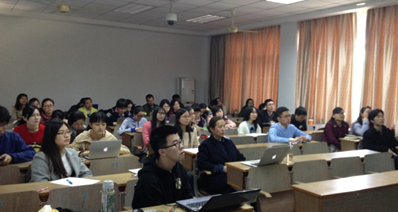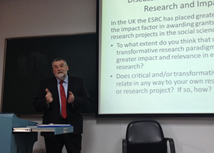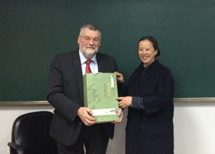
Date: 2015-04-27 Visitcount: 2173
An excellent lecture entitled “Critical Social Theory, Pragmatism and Transformative Research” was delivered by Professor Michael Wilson from the University of Leeds on April 14th. Professor Michael Wilson’s principle research and teaching interests are in international, comparative and intercultural aspects of educational leadership and management both in schools and the higher education. Throughout the lecture, he shared his ideas about critical social theory, pragmatism and transformative research.
The aim of the lecture was to consider two research paradigms which can be regarded as transformative in using research to bring about social and educational change. These were critical social theory and pragmatism. Examples were also raised to help the audience understand transformative research better.
Professor Wilson introduced four representatives of critical social theory: Marx, Habermas, Paulo Freire and Bell Hooks. Marx thought education was a means of control through “false consciousness”. Students were forced to learn what the capitalist system needed through “hidden curriculums”, such working skills, discipline and so on. However, unemployment and complaints about employees’ bad skills called Marxist theory into question. As a result, Neo-Marxism focused more on schools that taught students an ideology which sells the capitalist dream to working-class children to make them willing to work for the capitalist system. They are also concerned about critique of global trends in education and critical race theory. Professor Wilson then gave a few examples to explain three forms of knowledge: work, practical and emancipatory knowledge, which was distinguished by Habermas. Habermas advocated a theory of communicative action based on the “logics of argumentation” to counter what Weber described as the “iron cage” of bureaucracy. Professor Wilson then introduced the ideas and application of critical pedagogy of Freire and Bell Hooks. What they had in common was trying to find an effective way to teach disadvantaged people, for example, minorities.
In the second part of the lecture, Professor Wilson talked about John Dewey and Tao Xingzhi’s pragmatism education as well as the capabilities approach. John Dewey had been widely associated with the application of pragmatism to the democratisation of education and more progressive approaches to teaching and learning. In Professor Wilson's opinion, one of the excellent points of Dewey’s works was making education more relevant to people. He said if education experts wanted to be recognized, they need to listen to the people they want to help. Dewey’s global influence on progressive education has been profound, including educational innovations in the rural reconstruction of China in the 1920s. One of Dewey’s followers was Tao Xingzhi. Tao Xingzhi was influenced by both the education theory of Dewey and of Wang Yangming. Considering the Chinese condition in the 1920s, Tao practiced Dewey’s and Wang’s theories creatively. Dewey thought “Education is life” while Tao argued that “Life is education”; Wang said “Knowledge-action” (Zhi-Xing) while Tao thought “Action-knowledge” (Xing-Zhi). The Capabilities Approach originated with the economist Amartya Sen as an alternative theory of welfare economics and was further developed by the philosopher Martha Nussbaum. “Capabilities” were opportunities for an individual to lead a fulfilling life, but “functioning” and education are part of them. Professor Wilson also presented a case study on how the Capabilities Approach might be operationalized through combining Participatory Action Research (PAR) and Critical Systems Heuristics (CSH) in researching Education for Rural Transformation (ERT) in disadvantaged communities in rural Nepal.
After the lecture, Professor Wilson engaged in further discussion with the audience on some education issues in China and in UK, such as how to develop critical thinking, how to improve poor living conditions through education, what the British government thought about their students’ PIZA results, and so on.




